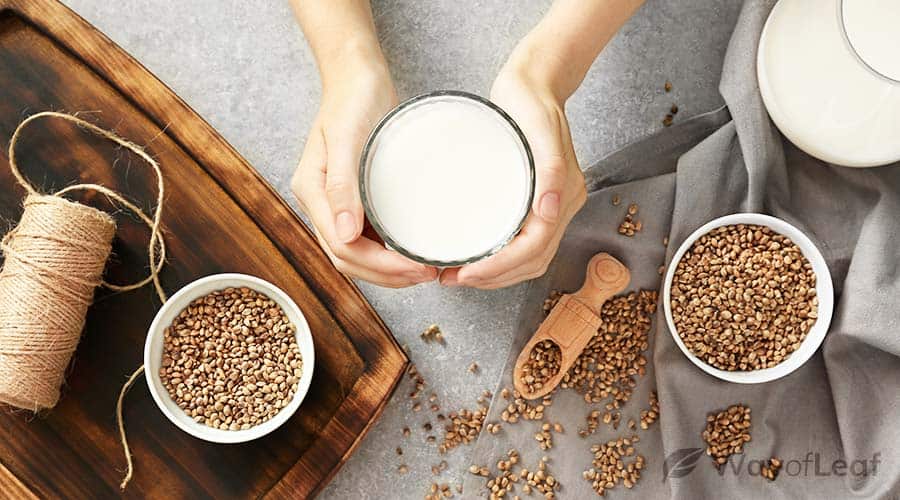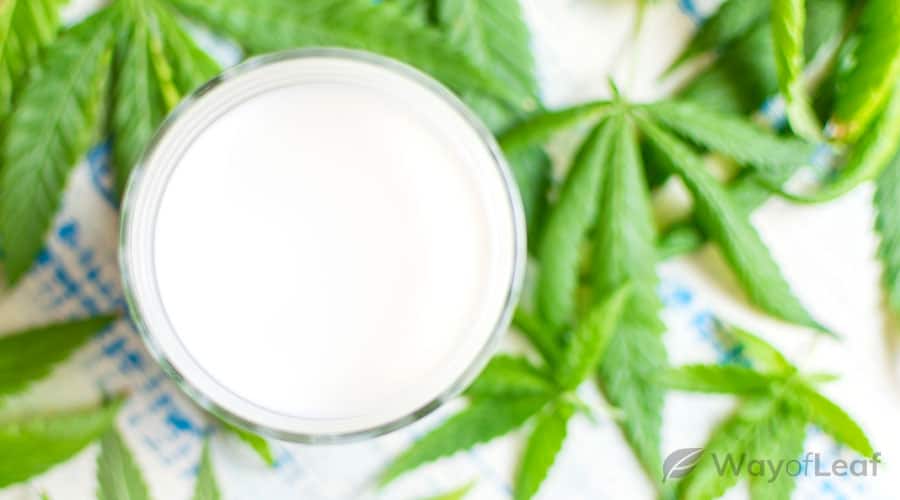Hemp milk is a plant-based, vegan-friendly alternative to cow’s milk that’s taking the U.S. and the rest of the world by storm. This non-dairy milk is rich in polyunsaturated fats, essential amino acids, and omega-3 and does not contain any sugar or cholesterol.
You can add hemp milk to your coffee, use it to create delicious milkshakes, or enjoy it on its own. Furthermore, hemp milk is entirely THC-free, so it is non-intoxicating.
Read on to find out more about hemp milk and its potential health benefits.
What Is Hemp Milk Made from?
You may be wondering, what is hemp milk made from? Well, it is made by soaking and grinding the hemp plant’s seeds in water (you can use hemp seeds to make protein powder, milk, oil, and a host of other food items). After processing, hemp milk has a creamy consistency rather than an oily one characteristic of other plant-based milk products.

As mentioned, hemp milk does not cause a high because it contains no THC. Consequently, most manufacturers claim that hemp milk is legal across the United States. Furthermore, the legalization of industrial hemp in the United States solidifies these claims.
As hemp milk’s popularity increases, well-known brands such as Tempt and Pacific will be at the forefront of this burgeoning multi-million-dollar industry.
Hemp Milk Nutrition & Taste
There are a host of hemp milk benefits because it contains significant amounts of many essential amino acids. It also includes trace amounts of several more. Reputable brands ensure their hemp milk contains no phytates. These are enzyme inhibitors found in certain plant-based products known to interfere with the assimilation of essential minerals.
Hemp milk has a very different taste than soy or rice milk and is a touch thicker than its counterparts.
Hemp protein is also easier to digest than its soy counterpart because it doesn’t contain complex sugars (known as oligosaccharides). These sugars cause flatulence when they are not broken down properly during digestion!
Regarding taste, hemp seeds have a creamy and nutty flavor, which makes them similar to sunflower seeds. You create hemp milk by first pulverizing the seeds. Then, you blend the remnants of the seeds with water and strain the solid residue. Hemp milk has a very different taste than soy or rice milk and is a touch thicker than its counterparts.
Here is a quick overview of the nutritional value of unsweetened hemp milk (based on one U.S. cup, approximately 236 ml):
- 70 calories
- 5g of fat
- 5g of saturated fat
- 2g carbohydrates
- 3g protein
As hemp milk is becoming more and more popular, you can find it in several flavors, including vanilla and chocolate. You also have the choice between ‘long life’ milk you store in the cupboard or ‘fresh’ hemp milk, which you refrigerate. Plain hemp milk contains no sugar or cholesterol and is also gluten and soy-free. It is an excellent choice if you have allergies to dairy products, but still miss the taste of milk.
Best Hemp Milk Recipe
Aside from its positive nutrition facts, hemp milk is easy to make.
You will need the following ingredients:
- A cup of shelled hemp seeds.
- Five cups of purified water.
- A natural sweetener such as raw honey or stevia.
Overall, this recipe could make 6 cups, and it can stay fresh in the fridge for at least three days. We recommend keeping it in a sealed glass mason jar and shaking the container before each use.

Without further ado, here is how to make hemp seed milk:
- Put the water and hemp seeds into a blender.
- If you want thicker milk, use less water. If you would like your concoction to have a consistency similar to dairy skim milk, add more water.
- Turn the blender on full power for a maximum of three minutes.
- If you wish, sweeten the milk by adding honey or stevia after blending.
- Blend again if you add sweetener.
- Drain it through a cheesecloth to remove large seed particles.
- Enjoy your milk in good health!
Incidentally, you can use the leftover seed pulp as a facial mask or body scrub. Some users even find it useful as an addition to their compost heaps.
Hemp Milk Dangers
For those concerned about any possible hemp milk dangers, remember that hemp milk is perfectly healthy as long as it comes from a reputable brand and is free from potentially harmful additives.
However, an increasing number of non-dairy milk options contain processed ingredients that could threaten your health. As a result, we urge you to avoid hemp milk that includes any of the following:
Carrageenan: This is a seaweed-based additive. It is so damaging to your digestive tract; it is used to induce colitis in lab animals! According to the World Health Organization (WHO), carrageenan is a possible human carcinogen.
Natural Flavors: Be wary of any hemp milk that contains the phrase ‘natural flavors’ as part of its ingredients list. Companies that do so avoid the requirement of outlining its use of additives such as artificial sweeteners and MSG.
Vegetable Oils: Hemp milk that also contains canola oil, corn oil, soybean oil, or safflower oil is bad news. Getting liters of oil from corn is hard work. It typically involves the use of high heat and high pressure, toxic solvents, and other unwanted agents. It is a combination that damages the delicate chemical structure of fatty acids. Sadly, soy and corn oils often come from GMO crops.
Hemp Milk vs. Almond Milk
Organic hemp milk is a relatively new phenomenon (at least where the general public is concerned). In contrast, almond milk has a long history as the health-conscious person’s go-to traditional milk alternative. We will go through the benefits of hemp milk in more detail below. First, let’s see what almond milk brings to the table.
Although creating homemade hemp milk is slightly easier, you shouldn’t have much trouble with DIY almond milk. Soak almonds in water for a few hours. Next, drain them and blend with more water until it has a milky texture. Drain the almond ‘milk’ and set the leftover bits aside. It is ideal for vegans or those who have an intolerance to lactose. Almond milk also has a lot of vitamins, minerals, and overall health benefits.
What Does Almond Milk Contain?
- Magnesium: A mineral that breaks food down into energy and helps maintain healthy bones.
- Vitamin E: A crucial antioxidant that stops free radicals from damaging cells.
- Unsaturated Fat: Reduces the risk of heart disease.
- Potassium: Keeps blood pressure under control.
- Manganese: Helps maintain healthy teeth and bones.
- Selenium: Prevents tissue and cell damage by boosting the immune system.
- Flavonoids: Essential for a healthy heart.
- Minimal calories or fat: Almond milk is an excellent low-calorie alternative to regular milk.
- No additives: Unfortunately, cows are sometimes injected with growth hormones and antibiotics to ensure they produce more milk. There are no such issues when you use almond milk.
Almond Milk Disadvantages
There are relatively few hemp milk side effects, but we can’t say the same for its almond counterpart. While it is nutritious, almond milk offers the following disadvantages:
- It is not suitable for people with nut allergies.
- When produced commercially, almond milk contains more sugar than cow’s milk.
- It doesn’t contain the right nutrition profile for infants. As a result, you can’t use it as a substitute for breast milk or formula.
- It has a ‘goitrogenic food’ classification. This means it contains chemicals capable of damaging the thyroid when you consume it in large amounts.
Overall, both forms of milk are good alternatives to cow’s milk for adults. It is not advisable to use hemp milk for babies or toddlers, however. Like almond milk, it doesn’t contain the right levels of nutrition. Hemp milk has a slight edge because it doesn’t contain sugar and has fewer calories. It is perfect for people with nut allergies and individuals with a compromised thyroid function.
Is Hemp Milk Good for Your Health?
The simple answer is ‘yes,’ hemp seed milk is ideal for most people. There are few calories in hemp milk, making it an excellent addition to a healthy lifestyle. It is especially helpful if you’re trying to lose weight.
Regarding the hemp milk ingredients, if you decide to make it at home, there are only two. You need water and shelled hemp seeds (although you could also add a sweetener if you choose).
Here is a list of hemp milk’s considerable benefits. Among other things, it contains:
- Omega-3 & Omega-6 Fatty Acids: Both are vital for healthy brain function. Unusually for an off-the-shelf product, hemp milk provides the ideal 3:1 ratio of Omega-3 to Omega-6 acids.
- Vitamins: Just one cup of hemp milk contains 10% of your RDA for vitamin A. It also has 25% of your daily vitamin D and vitamin B12 requirement, and at least 6% of your vitamin E RDA.
- Minerals: Most brands add calcium to hemp milk during processing, and you also benefit from high doses of magnesium and iron.
- Amino Acids: Hemp milk contains essential amino acids.
Benefits of Hemp Milk
The combination of all this natural goodness means you may benefit from:
- Better skin, hair, and nails
- An improved immune system
- A source of vitamins and minerals that is low in calories while being free from fat and cholesterol
- Sharper mental skills
- Reduced risk of heart disease
Depending on the brand you use, however, there could be some hemp milk side effects. These may include:
- Stomach ache from the tannins and saponins in hemp.
- Nutritional deficiencies (if consumed by babies).
- Allergic reactions, such as allergic rhinitis, asthma, hives, eye irritation, and anaphylaxis. Such problems are rare, but they do happen.
- Products containing synthetic B12 (also known as cyanocobalamin) could result in low potassium levels in the blood. This condition is also called ‘hypokalemia.’
- If there are gelling agents in store-bought hemp seed milk, it could cause abnormal digestive activity. Examples of harmful gelling agents include carrageenan (Tempt and Pacific don’t use it anymore), guar gum, and xanthan gum.
Hemp Milk Side Effects
Most people who consume hemp milk are unlikely to experience any hemp milk side effects. However, in rare cases, some people may experience the following hemp milk side effects:
Allergic Reaction
Look out for any indications of an allergic reaction to hemp milk and any of its additives and ingredients. These can vary in severity from hives and rashes to anaphylaxis.
Stomach Aches
As mentioned, hemp milk is made from the seeds of the hemp plant. Hemp seeds contain tannins, which are water-soluble polyphenols, and other naturally-occurring compounds called saponins. These compounds may cause stomach ache in some people.
When discussing the hemp milk dangers above, we mentioned that some brands use the additive carrageenan and highlighted its potential health risks. Some brands also add thickeners like guar gum or xanthan gum. These gelling agents can lead to stomach aches, bloating, and inflammation of the digestive tract. Therefore, it is crucial that you read the list of ingredients before purchasing hemp milk to make sure that it is free from these potentially harmful additives.
Low Potassium Levels
Some brands add cyanocobalamin, which is a synthetic version of vitamin B12, to their hemp milk. In rare cases, cyanocobalamin may lead to hypokalemia, which is the medical term for low potassium levels in the blood.
Diabetes
It is important to note that some hemp milk products are high in added sugars, which may increase the risk of developing diabetes over time. Again, always read the label before deciding which hemp milk to buy.
Pros and Cons of Hemp Milk vs. Non-Dairy Milk
The table below highlights the pros and cons of hemp milk compared to non-dairy milk alternatives, such as coconut milk, almond milk, soya milk, oat milk, and rice milk.
| Milk | Pros | Cons |
|---|---|---|
| Hemp Milk |
|
|
| Coconut Milk |
|
|
| Almond Milk |
|
|
| Soya Milk |
|
|
| Oat Milk |
|
|
| Rice Milk |
|
|
Where Can I Buy Hemp Milk?
If you don’t want to make hemp milk yourself, you can purchase high-quality options such as chocolate hemp milk and coconut hemp milk online. There are a host of reputable brands, which is hardly a surprise given the growth of the market.
The Farm Bill has opened up the market in the United States. A recent report by ResearchandMarkets.com suggests the hemp milk market will have a value of $454 million by 2024.
Milk no longer refers solely to the dairy product we used to enjoy as kids. An increasing number of people are lactose intolerant, which means ‘traditional’ cow’s milk is off the menu. Fortunately, you can extract a delicious substitute from hemp seeds and derive an array of impressive health benefits. Hemp milk is easy to find online and is rich in vitamins and minerals. It is also low in calories, fat, and cholesterol. Best of all, hemp milk tastes fantastic.





![Is Kief Stronger Than Regular Cannabis? [Answered]](https://wayofleaf.com/wp-content/uploads/2018/11/wol-banner-is-kief-stronger-than-regular-cannabis-640x225.jpg)

![How Long Does CBD Stay in Your System? [Answered]](https://wayofleaf.com/wp-content/uploads/2019/03/mj_how-long-does-cbd-stay-in-your-system_1920-640x225.jpg)

![What Is MCT in CBD Oil? [Comprehend a Label’s Ingredients]](https://wayofleaf.com/wp-content/uploads/2019/04/mj_mct-in-cbd-oil_1920-1-640x225.jpg)


